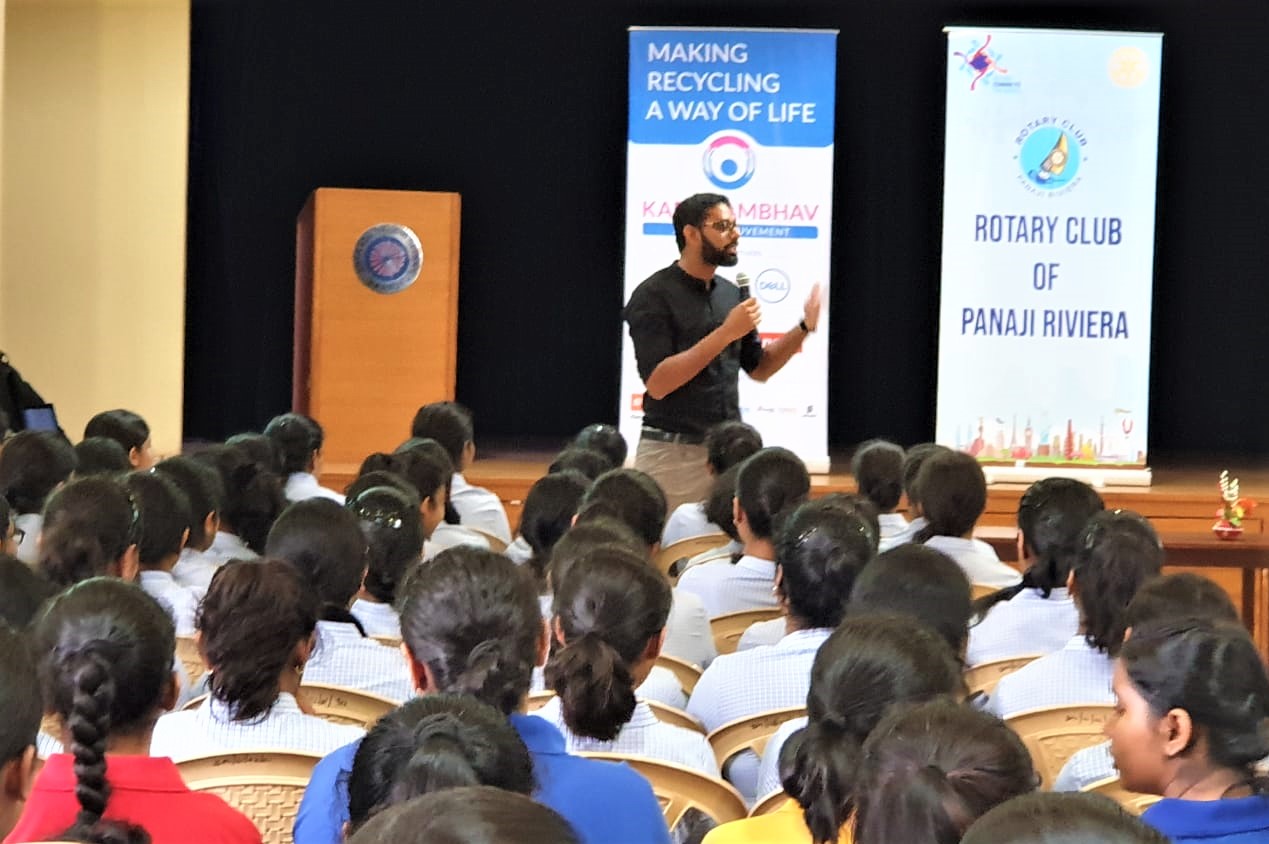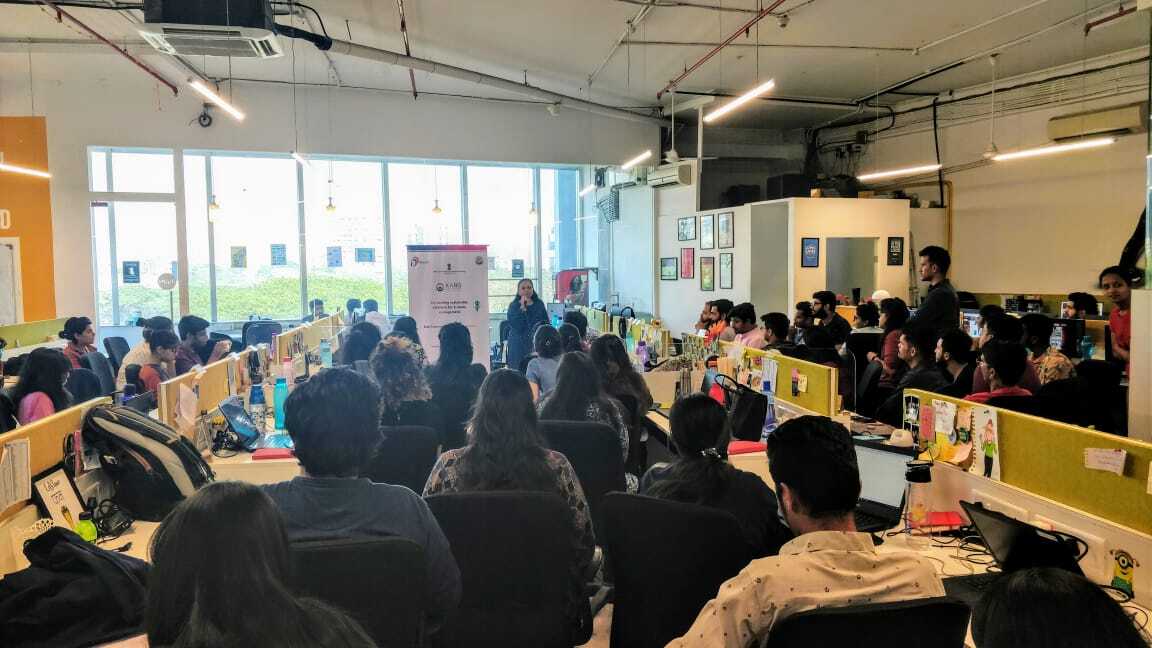Meet our new Ashoka Fellow Pranshu Singhal, Founder of Karo Sambhav

Pranshu completed a Master’s in Environment and Policy at Lund University in Sweden, where he was mentored by Professor Thomas Lindhqvist, who first proposed the Extended Producer Responsibility (EPR) principle for waste management. The principle of EPR extends the involvement of producers of any product beyond sales and after sales service to include end-of-life treatment of products.
After working in various key positions in sustainability at Nokia and Microsoft for over seventeen years, Pranshu founded Karo Sambhav in 2017, India's leading Producer Responsibility Organization.
Karo Sambhav collaborates with enterprises and enables them to close their material loops by designing and implementing transformative EPR programs for waste from electronics (E-waste) and plastics.
The organization aims to bring a paradigm shift in waste management sector by putting accountability, transparency and trust in the system.
-
How did you become interested in social innovation and why are you a social entrepreneur?
Three years back, the Indian Government presented a new type of regulation which introduced the principle of EPR for e-waste management and mandated that any organization/producer putting a product on the market has to play a key role by doing consumer awareness programs. This involves setting up collection channels across all states of India wherever they're selling the product, as well as meeting a collection target for end-of-life products.
However, at that time, there were no service providers who could provide a detailed solution to the producers and who had created a grass-root ecosystem that could comply with these regulations. This was a huge gap. Multiple producers were looking for a well-governed and responsible solution in the market, and there was none.
That is why, we decided to set up Karo Sambhav.

At that time everyone told me that I was attempting an impossible task. And for us, that became the mission. That's why we named the organization “Karo Sambhav”, which translates in English as “Make it possible”. We decided to make it possible by collaborating with people, producing new frameworks, using technology, and doing grassroots innovation. Indeed, our primary objective was to go ahead in this journey and show success in the use of the EPR principle by bringing together some organizations who had the willingness and vision to do transformative work in India.
That's how our journey started. It was a very significant shift moving from a regular waste regulation to an EPR based regulation. And it was very important to show success at an industry level as well as at a governmental level.
-
Throughout this whole journey, what would you say was the biggest challenge?
The biggest challenge was that this was not an established industry in India. And, when we started, we were the first ones talking about ethical and fair-trade practices, well-governed systems, digital payments, etc. We ensured full transparency and made all transactions traceable. This was very new and continues to be fairly new to the sector, which meant that we were disrupting every single existing practice in the industry.
Hence, the biggest challenge has been creating the industry itself. Industry creation requires working with all types of stakeholders including grassroots waste-pickers and waste-aggregators, informal sector, etc. These are shifts to completely new ways of running businesses.
To create an industry solution, it was also required to create win-win solutions across stakeholder groups. This initiative has now been taken with Karo Sambhav.
-
What is the main impact that Karo Sambhav has achieved so far?
Today, the volume of waste that we have collected is big but is nothing compared to the extent of the problem in India. India generates almost two and a half million tons of electronic waste a year. We have collected around 11,000 tons until now. If you compare it to the whole problem, there is still a long way to go.

Therefore, I think the biggest impact achieved is a mindset shift. The whole conversation has changed. When we started, people were asking why they should do this. Now, the conversation has shifted from Why to What. People are wondering what they should do, and they are trying to do it. The conversation has further shifted to How: “How do I change things and do it better”. We are currently moving to a place of effectiveness, efficiency, costs optimization, fair trade, and a better system.
It's a matter of behavior in the long term. The behavior of large corporations, governments, civil society organizations, waste-pickers and aggregators. It is also a matter of how we create a common thread amongst all of them so that there is a good alignment to bring a large impact. This shift in behavior is what I would call success at this point in time.
-
What did it mean for you to be selected as an Ashoka fellow?
Being selected as an Ashoka fellow was a kind of re-confirmation that the direction we are taking is right.
Being an Ashoka Fellow gives a lot of comfort since it implies that there are organizations that will support us. Because difficult times always come. And if we are able to work with these networks, we will only go forward. There will be partnerships and collaborations of different nature that have not ever been imagined.
-
What will you do as part of the Dela Programme?
In the journey with IKEA, we are figuring out what is it that is required to create world class systems processes and a secondary material value chain. The future is about the utilization of secondary materials. In a couple of decades, we will be left with no material but waste to create new products. Unless we are able to create fantastic supply chains out of waste, we will not be able to solve the problem at a large scale.
Thus, as part of the Dela Programme, we are looking at a very complex problem in the value chain, which is how do we ensure that secondary materials truly become circular.
When we collect waste after recycling it, what happens to the material which is recycled? Can they be reutilized for making the same quality products? Or the same type of products from where the materials were extracted? These are the questions we are looking at to bring solutions.

This is a supply chain creation. Supply chain has been created for primary materials, but we also need to create supply chains for secondary materials. There are hundreds of technical requirements for virgin materials and we need the same number of requirements for secondary materials as well as for the traceability criteria. The rules and regulations, the standards, the technical, governmental and ethical requirements that should exist in the secondary material value chain are some of the aspects we are debating with IKEA as part of the Dela Programme, which will ultimately help Karo Sambhav to create a secondary material value chain.
-
In your opinion, what needs to happen next?
If we have to move forward, I think the biggest aspect is building capacities across the value chain so that behavior continues to change. For enforcement to happen, it depends on how good capacities are created. Today there are organizations that are not following the law, which essentially creates unfair level-playing field. Enforcement brings in a trust in the law that the law has to be followed.
Consequently, it is important that good positive enforcement happens to reinforce the trust of good organizations. This change of direction can be achieved at a country level by partnering with civil society organizations and multilateral institutions, by working on capacity building of government, by engaging in better enforcement practices, etc.
-
What type of awareness programs does Karo Shambav have and what is their main goal?
In Karo Sambhav, we develop a whole range of awareness programs at the grassroots level. School program is, for example, one of the biggest programs through which we have reached close to 3000 schools and several thousand teachers who are training a few million students through the program. Similarly, there are other programs that we do for consumers including radio, digital and social media campaigns, etc.
The objective of our programs is to really bring in the point that it is also our responsibility as individuals and consumers to manage our waste in a responsible manner. People are also equal participants in this shared responsibility because production will not happen if consumption is not there. We need to not only look at the production but also at the consumption angle.
Our awareness programs and campaigns are structured to create positive behavioral changes while trying to make sustainable consumption patterns so that people have a positive role by participating in these schemes and asking tough questions if waste is not being recycled.
Those conversations need to happen, and this is the primary objective of our awareness campaigns, because when conversations happen, action comes. You can't drive an action without a conversation.
-
What are the key goals that need to be accomplished to solve this challenge? And, how do you contribute to achieving these goals?
First of all, Karo Sambhav has taken a platform-based approach. We are not just limited to electronic waste. We are now also able to tackle similar platforms required for solving plastic waste, tire waste, mattresses waste, etc. The idea is how to create a platform which enables solving the waste problem not just for one but multiple complex waste streams.

Secondly, we are building capacities and competence across the value chain. So that producers and brands understand that they need to comply with the regulations with intent. Consumers and individuals understand their role for a circular economy to exist and an enabling environment is created for change to happen. These are very complex regulations and they require continuous tweaking and rethinking. We also support government efforts in understanding and creating better versions of these complex regulations.
